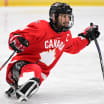North Division playoffs could start same day season ends, Daly says
Deputy Commissioner talks U.S.-Canada border situation, Draft, next season with NHL.com

© Mark Blinch/Getty Images
But many questions remain: When will the rest of the Stanley Cup Playoffs start when the regular season isn't scheduled to end in the Canada-based Scotia North Division until May 19? Will teams be allowed to cross the Canada-United States border without quarantining in the semifinals and perhaps the Stanley Cup Final, and if not, what is Plan B? What are the plans for the 2021 NHL Expansion Draft, the 2021 NHL Draft and the 2021-22 season? Is the NHL considering changing the schedule matrix and playoff format in the future?
NHL Deputy Commissioner Bill Daly provided some answers in an interview with NHL.com.
The regular season was scheduled to end May 8 but has been delayed due to the coronavirus pandemic. The Discover Central Division finished the regular season Monday. The MassMutual East Division is scheduled to finish Tuesday and the Honda West Division on Thursday. After the Vancouver Canucks play at the Edmonton Oilers on Saturday, the North Division will have three regular-season games remaining, each between the Canucks and Calgary Flames, on May 16, 18 and 19.
Each of the three United States-based divisions could open the playoffs before the North Division finishes the regular season.
"Our current expectation is that we'll play out the regular season and that the playoffs in the North Division will not officially start until after the conclusion of regular-season games in that division," Daly said Monday. "I would assume that would be very soon thereafter. It could be the same day."
Quarantine requirements at the United States-Canada border were the main reason the NHL realigned and played only within divisions this season, but the playoff format guarantees a Canada-based team will play a U.S.-based team in the semifinals and could play one in the Stanley Cup Final. The top four teams in each division qualify for the playoffs and face each other in the first two rounds, seeded by order of finish.
Daly said the NHL has applied for a national-interest exemption with the Public Health Agency of Canada and the federal government of Canada that would allow United States-based teams to cross the border into Canada and Canada-based teams to return from the United States without quarantining.
"We're at the stage where our Canadian clubs are currently working with their local and provincial health agencies to get support for that application, and that's in process," Daly said. "We would hope that we're in a position maybe by the end of the first round of the playoffs to know where we'll be come the third round of the playoffs."
The NHL and the NHL Players' Association announced Saturday protocols would be relaxed in the playoffs for teams with 85 percent of the traveling party fully vaccinated.
"The vaccination rates are really different, and they differ market by market and team by team," Daly said. "We had reached a point where we thought we had a critical mass of vaccinations, or vaccinated teams, such that a relaxation of the protocols would be appropriate in certain circumstances. … It's something we've been monitoring all season long, and we felt like the start of the playoffs was an appropriate time to invoke those new provisions."
However, the protocols could change if necessary. Daly said the principal basis of the application for the national-interest exemption was an extensive document of health and safety protocols that would be in effect, and they must be designed to limit interaction between team members and the general public in Canada.
"If we're successful in gaining the national-interest exemption, we'll make adjustments to protocol to make sure that [the authorities in Canada are] comfortable," Daly said. "… We've made very clear to the U.S.-based clubs that we may have to adjust some of the protocols we just issued for relaxation in the case of syncing up of the national-interest exemption for travel into Canada."
What if the NHL is unsuccessful in gaining the national-interest exemption?
"I think the obvious Plan B is that if we can't do that, we'll find a market, a host market in the United States, where the Canadian team would play out of," Daly said.
None of the seven Canada-based teams has had fans in attendance this season, but each of the 24 United States-based teams has had fans in attendance at some level, varying market to market based on local regulations. The numbers have increased over time, and Daly said he expects that to continue in the playoffs.
"The clubs have a process that they go through in terms of applying for increased capacity," Daly said. "We have protocols that govern that application, and we review those applications, obviously first and foremost [to] ensure that they're consistent with local regulations, and we issue approvals if deemed appropriate."
Daly said the NHL is working on a gathering of prospects in early July to serve at least some of the function of the NHL Scouting Combine. NHL Chief Content Officer Steve Mayer and the events staff are working with the Seattle Kraken on plans for the expansion draft July 21, trying to be fun and creative while working around the situation.
"Don't have any announcements as to what that will look like quite yet, but my guess is it'll be something special," Daly said. "It's going to have a personality."
The NHL Draft will be July 23 and 24, held virtually like it was last year.
"We do expect it to be quicker with respect to the second day, making it less dependent on the television production and more on the time periods for selections," Daly said.
The NHL hopes to be as close to normal as possible next season. The League and the NHLPA have agreed to return to the previous alignment, with the Kraken in the Pacific Division and the Arizona Coyotes moving to the Central Division. The schedule matrix and playoff format are to be as they were in 2018-19, the last full season before the pandemic.
That assumes the United States-Canada border situation will be solved.
"If it still continues to be a concern, we might have to have another workaround," Daly said. "We're all proceeding on the hope that by the time we get to training camp next September that the major issues with cross-border travel will have been put behind us, but again, that's a big assumption."
As for the future, Daly said the NHL has canvassed the general managers on longer-term views regarding the scheduling matrix and playoff format.
"We're still in the process of gathering that information from all the various clubs," Daly said. "We're going to have to discuss it obviously internally and also with the Players' Association. That's why it's not happening as early as '21-22. We'll put all that information together, process it, discuss it as we need to hopefully over the course of the summer and maybe be in a position to say what that looks like for '22-23 before the start of the '21-22 season."

















